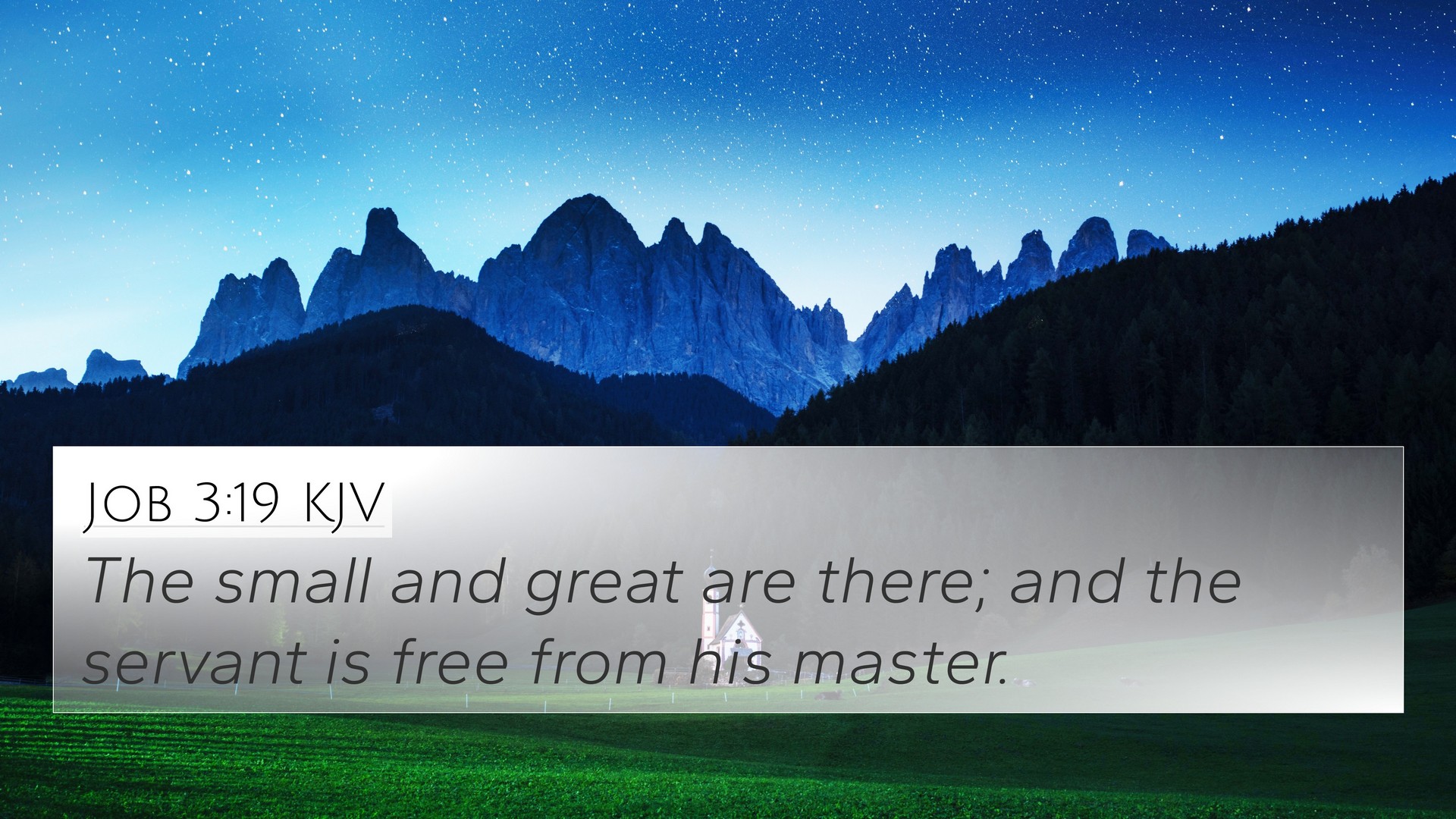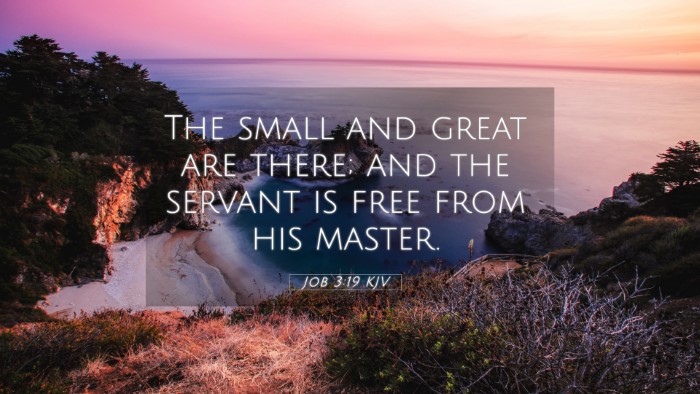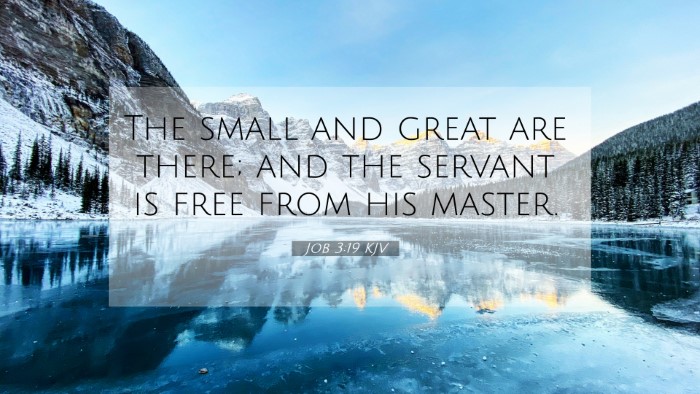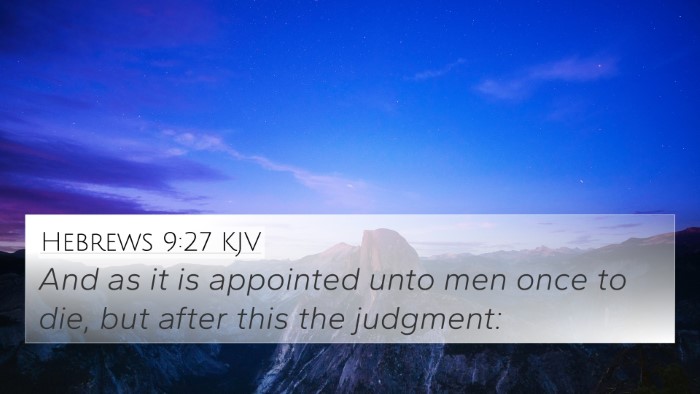Old Testament
Genesis Exodus Leviticus Numbers Deuteronomy Joshua Judges Ruth 1 Samuel 2 Samuel 1 Kings 2 Kings 1 Chronicles 2 Chronicles Ezra Nehemiah Esther Job Psalms Proverbs Ecclesiastes Song of Solomon Isaiah Jeremiah Lamentations Ezekiel Daniel Hosea Joel Amos Obadiah Jonah Micah Nahum Habakkuk Zephaniah Haggai Zechariah MalachiJob 3:19 Similar Verses
Job 3:19 Cross References
The small and great are there; and the servant is free from his master.
Uncover the Rich Themes and Topics of This Bible Verse
Listed below are the Bible themes associated with Job 3:19. We invite you to explore each theme to gain deeper insights into the Scriptures.
Job 3:19 Cross Reference Verses
This section features a detailed cross-reference designed to enrich your understanding of the Scriptures. Below, you will find carefully selected verses that echo the themes and teachings related to Job 3:19 KJV. Click on any image to explore detailed analyses of related Bible verses and uncover deeper theological insights.

Job 30:23 (KJV) »
For I know that thou wilt bring me to death, and to the house appointed for all living.
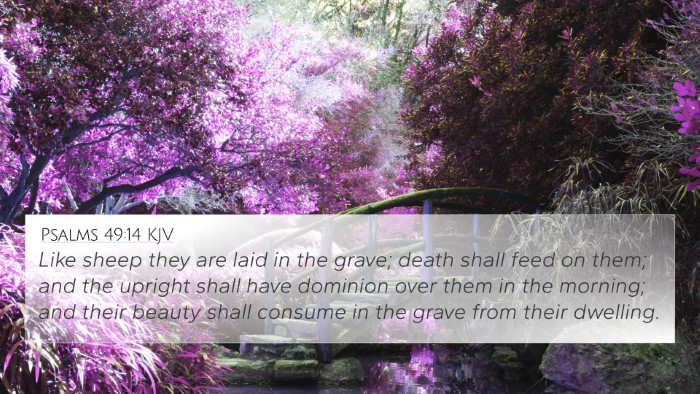
Psalms 49:14 (KJV) »
Like sheep they are laid in the grave; death shall feed on them; and the upright shall have dominion over them in the morning; and their beauty shall consume in the grave from their dwelling.
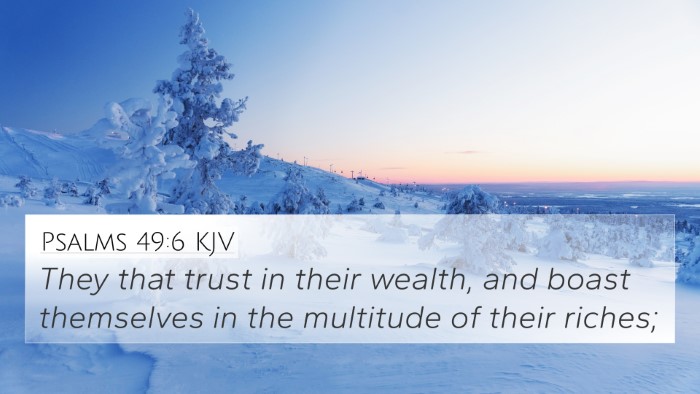
Psalms 49:6 (KJV) »
They that trust in their wealth, and boast themselves in the multitude of their riches;
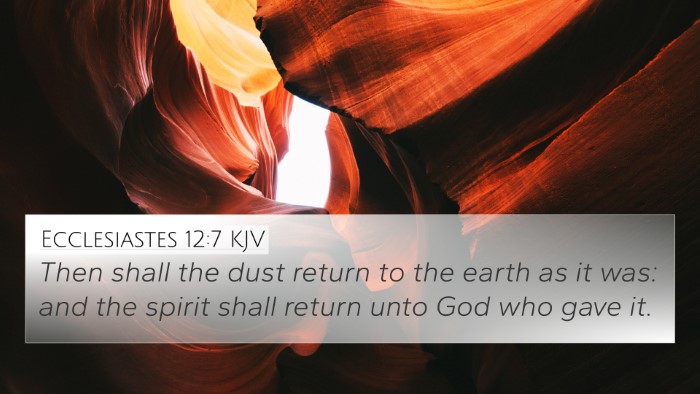
Ecclesiastes 12:7 (KJV) »
Then shall the dust return to the earth as it was: and the spirit shall return unto God who gave it.
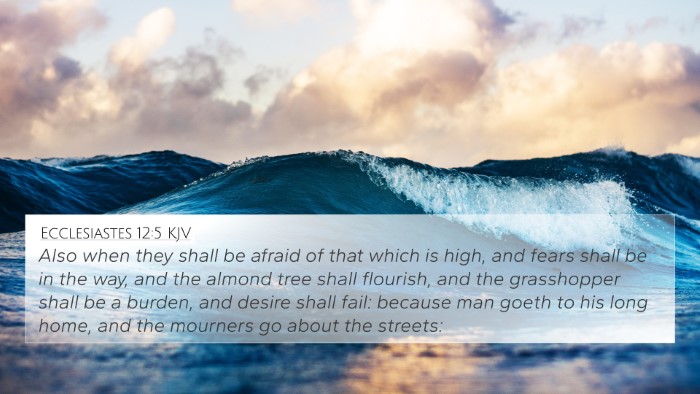
Ecclesiastes 12:5 (KJV) »
Also when they shall be afraid of that which is high, and fears shall be in the way, and the almond tree shall flourish, and the grasshopper shall be a burden, and desire shall fail: because man goeth to his long home, and the mourners go about the streets:
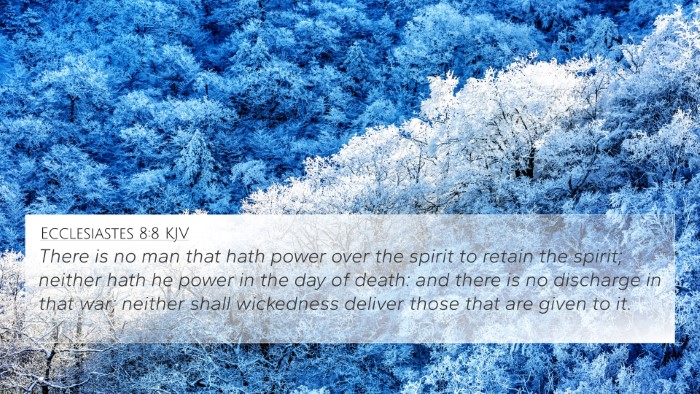
Ecclesiastes 8:8 (KJV) »
There is no man that hath power over the spirit to retain the spirit; neither hath he power in the day of death: and there is no discharge in that war; neither shall wickedness deliver those that are given to it.
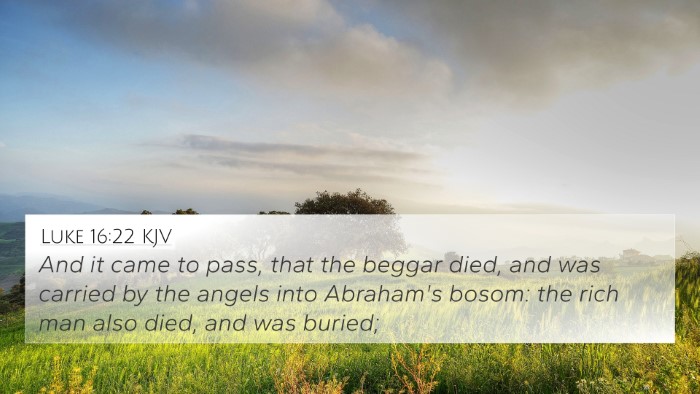
Luke 16:22 (KJV) »
And it came to pass, that the beggar died, and was carried by the angels into Abraham's bosom: the rich man also died, and was buried;
Job 3:19 Verse Analysis and Similar Verses
Understanding Job 3:19
Job 3:19 states: "The small and the great are there; and the servant is free from his master." This verse captures a profound moment in the Book of Job, where Job reflects on life, death, and the state of humanity in the face of suffering.
Overview of Job 3:19
In this verse, Job is contemplating the nature of death and the equality it brings. It expresses a stark reality that in death, all distinctions of status and power are erased. This theme is prevalent throughout the Scriptures, underscoring the transient nature of earthly life and the ultimate equality found in death.
Commentary Insights
Matthew Henry's Commentary
Matthew Henry notes that Job is in a state of despair where he wishes for death to escape his suffering. He emphasizes how death is a great leveler, where there is no regard for social status. In death, the rich and the poor, the powerful and the powerless, find themselves in the same state, highlighting the futility of earthly distinctions.
Albert Barnes' Commentary
Albert Barnes elaborates on the philosophical implications of this statement. He points out that Job signifies a longing for relief from his torments, implying that those who have suffered immensely would prefer equality in death. He affirms that the distinctions made in life, such as master and servant, lose their significance in the face of mortality.
Adam Clarke's Commentary
Adam Clarke offers a perspective that suggests Job expresses a theological reflection on mortality. He argues that the verse reveals a poignant truth about the human condition: in the realm of the dead, all are equal. Clarke highlights that this equality exists regardless of one's earthly affiliations, pointing towards a deeper, spiritual truth regarding life and death.
Bible Cross-References
- Ecclesiastes 9:2: "All share a common destiny—the righteous and the wicked, the good and the bad, the clean and the unclean." This verse supports the idea that death is a shared experience for all.
- Job 1:21: "Naked I came from my mother’s womb, and naked I shall return." This emphasizes the idea of entering life and exiting in the same state.
- Psalm 49:10-12: "For the wise and the foolish alike will not be remembered; they will die like the beasts." It underscores that both wisdom and folly meet the same fate in death.
- Isaiah 14:11: "Your pomp is brought down to the grave, the sound of your stringed instruments; the maggot is spread under you, and worms cover you." This reinforces the point that death is the great equalizer.
- Romans 3:22-23: "For there is no difference between Jew and Gentile—the same Lord is Lord of all and richly blesses all who call on him." Here, it indicates God's impartiality to humans, particularly concerning their eternal state.
- Acts 10:34: "God shows no favoritism." This reflects God's equality among all humankind, which is reaffirmed in Job 3:19.
- Revelation 20:12: "And I saw the dead, great and small, standing before the throne." This verse emphasizes that before God, all are judged alike, regardless of earthly status.
- 1 Peter 1:17: "Since you call on a Father who judges each person’s work impartially." This reinforces the concept of equality before judgment.
- Psalm 146:3: "Do not put your trust in princes, in human beings, who cannot save." It suggests the futility of earthly power in the face of death.
- Job 30:20-23: Job laments further, indicating his cry for help and acknowledging his fate, which illustrates the themes of suffering and equality in mortality.
Thematic Connections
The themes of suffering, equality in death, and the human condition resonate throughout the Bible. Job 3:19 aligns with numerous scriptures that address the fragility of life and the equality it eventually brings. This verse can be utilized as an anchor for deeper explorations into topics regarding mortality and the nature of divine justice.
Comparative Analysis
By performing a comparative Bible verse analysis, one can see the continuity and unity in the scriptural message about death and equality. Job's lamentation is echoed in wisdom literature and prophetic writings—demanding that believers comprehend their societal roles with humility and foresight.
Conclusion
Job 3:19 serves not only as a reflective meditation on the suffering experienced by its speaker but also as a timeless reminder of humanity's ultimate fate. The equality found in death challenges believers to contemplate their priorities in life, the fleeting nature of status, and the hope of divine justice beyond the grave. Get equipped with tools for Bible cross-referencing to deepen your understanding and study of these connections in Scripture.
Further Exploration
For those seeking to enhance their studies, utilizing a bible concordance or a bible cross-reference guide can provide significant insights into the thematic and textual links within the Bible. Engaging in cross-referencing Bible study methods further helps in finding cross-references for comparative studies, allowing for deeper understanding and enriching theological insights.
